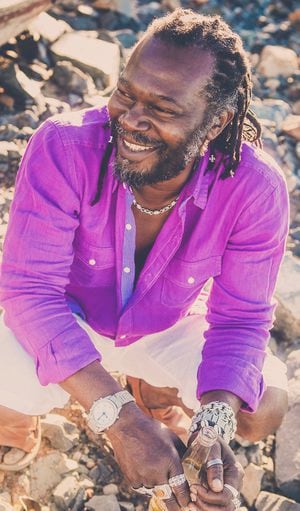Why Levi’s going back to his Roots
From ex-con to millionaire businessman, Levi Roots talks about his remarkable success and the three loves: food, family and music. . .

Few stories are as remarkable as that of Levi Roots. As a kid, he stood no chance. He went to Pentonville prison for six months at the age of 15 after being charged with assaulting a police officer. And later, when police raided his youth club, he was sent down for possession of drugs.
These days, he’s one of Britain’s most successful foodies. The man who put Reggae Reggae sauce into our lives following an unlikely and remarkable appearance on TV’s Dragons’ Den has made a small fortune. The man who ended his teens as Just Another Brixton Con is heading towards the end of his 50s as a role model with a net worth of some £35 million, or more. It is a remarkable, remarkable story.
And though his luck changed when he secured a 40 per cent investment in his business from Dragons’ Peter Jones and Richard Farleigh, the Levi of his success go further back. He credits Bob Marley, Nelson Mandela and Peter Jones as being his greatest mentors. He met Jones on TV, played football with Bob in Battersea Park and allowed Nelson’s example to inspire him.
His Reggae Reggae Sauce was also ‘a thing’ long before he appeared on Dragons’ Den. The singer-cum-author-cum-TV-star-cum-businessman had been selling it at Notting Hill Carnival for 15 years as well as playing in the music business for 30 years.
And as summer hits, Levi is feeling pretty good. His sauces, rubs, drinks, burgers and other Caribbean goodies sell by the truck load while his new album, Levi Levi Presents . . . Reggae Reggae Hits, was released yesterday.
The record is, so the press release tells us, the perfect fusion of Caribbean vibes, laid back reggae and BBQ party fun. It features 60 tracks with 27 top five hits hit singles including Bob Marley – The Sun Is Shining, Shaggy – Oh Carolina and It Wasn’t Me, and Johnny Nash – I Can See Clearly Now.
“I was asked to pull it together by the record company,” he says. “I thought it was great. I came up from the Sound Systems myself. Back in the day, we would play everything and anything. We’d get the dub plates from the producers a long time before the public could buy them. That was going on in the 70s, 80s and 90s and those years inspired me greatly.”
Levi’ love of music is well-known. He has his own BBC Radio 2 progamme and is a respected authority when it comes to reggae. So he’s smart enough to admit that Reggae Reggae Hits isn’t necessarily what he’d listen to in the car.
“This is not about my favourite songs, it’s about inspirational songs.
“Reggae wasn’t something you saw on Top of the Pops too much when I was growing up. I was seeing all these white people trying to say these words back in the 70s and I was the only one who could sing it in patois. Reggae is all about great memories for me.
“Recording my album in 2015 was one of my proudest moments. I went back to Jamaica and recorded in the studio where Bob Marley recorded six albums.
“Music is all about celebration. It’s about coming together. So one thing I love about doing this new record is that it’s not about new songs. When you’re at parties and having a great time, you don’t want new songs. You want to sing and dance to things you know. You want to know the lyrics. If you go to a party and everyone else is singing, you feel left out.”
Reggae has been the making of him. When he left Jamaica for Brixton at the age of 11, he found himself in constant trouble. He encountered Sus laws – stop-and-search laws – and police brutality, as well as riots. Previously, he’d only ever met one white person and his greatest skills were in climbing trees, rather than reading and writing. Music was his escape and no one was more important that Bob Marley.
“Bob Marley was important in two different ways. Firstly, as a musician. He took reggae music around the world. People had never heard of the island of Jamaica but they knew of the music. They couldn’t show you the island on the map but could sing Bob’s songs. The other thing that stood out was his involvement in the Rastafari movement. He bought that around the world and made people understand. The Rastafai movement was important in the fight against apartheid in South Africa. Everyone was playing reggae.
“But it’s still popular today. My sauce factory is in Poland and everyone loves reggae there. The stereo is all Jimmy Cliff and Toots and the Maytals, it’s Black Uhuru and Bob Marley.”
Against a chequered background, Levi – real name Keith Valentine Graham – made his way in Brixton. He’d always loved cooking, after helping his grandmother in the kitchen. She taught him the secrets and subtleties of mixing Caribbean flavours, herbs and spices. During that time, Levi also discovered his love for music at the church his grandmother sung at.
At 1991’s Notting Hill Carnival, Levi created a fusion between the food he was cooking and the music he was playing with Coxsone Sound System, opening the ‘Rasta’raunt’, which was so popular it is now an annual fixture at Carnival. Despite the sauce’s popularity it took another 16 years of rejection from banks and businesses to invest in the product who thought it looked and sounded ‘too black’.
His rise came about through Dragons’ Den. In 2006, Levi was spotted at the World Food Market by a BBC researcher and invited to appear on the programme. Levi had never even heard of the show, and went home to his kids asking them what Dragons’ Den was. They begged him not to appear saying; ‘Dad, don’t go on that show, they’ll just tear you to pieces’!
Although he was doubtful about the programme, Levi’s mother encouraged him to come back as a ‘Dragon Slayer’.
“I’d never seen Dragons’ Den. I’d never heard of the show. Nobody had mentioned it at all. A producer met me at an exhibition and gave me a business card and said I should call if I wanted to. I was totally not interested at all. My kids saw the business card – I’d just thrown it down. They said to me, ‘dad, there’s no way you should be thinking of this’. I said I wanted to sing a song on there. But everyone I talked to said don’t do it. But I decided to go on and just be myself. I decided if they didn’t accept me for who I am, that would be it . . . their loss.
“I had to do a screen test a week before the show because the BBC wanted to check the lyrics to my song weren’t controversial. I had to sing it to the producers a week before.”
He secured a £50,000 investment and overnight his life changed. The sauce was an instant hit. Peter Jones helped to get the sauce listed by Sainsbury’s, turning the dream into a reality. Levi’s success was nothing short of a whirlwind and he was later invited by then Prime Minister Gordon Brown to Number 10 in recognition of his notable success as a black man in Britain attaining financial achievement through enterprise. Levi equates his success to putting himself into the product.
“I had great support around me. My family were around me and I had Peter Jones around me. He was the perfect mentor. I was glad I didn’t get all the dragons, as a business, I think I got the right investor. Peter was the key one. His help helped me to navigate around all the things that came at me.
“I’d done 30 years of music before that, so being in the public eye was normal. The massive popularity that Dragons’ Den brought was manageable because I knew how to handle it. Without that, it would have been terrifying.
“The brand is Levi Roots. Nothing moves without me being involved. At first, we thought the brand could be Reggae Reggae Sauce. But then we realised it’s me. I have more than 50 products in the brand and not everything is Reggae Reggae. We have soft drinks range, burgers, crisps, peanuts, pasties, reggae meals as well as our own restaurant. But nothing moves without my approval and I’m always involved. If we’re stocking Tesco or Sainsburys, they don’t want to see anybody else but me.”
Levi looks back on his life-changing participation in Dragons’ Den as a Sliding Doors moment. It’s kept him young – so young that he’s got a four-year-old son.
“It was a great thing. It was a wonderful thing. I have hindsight now. Look, I have a four-year-old son and I can warn him about things and tell him about how I managed in my life. I can fast-track his life. You have to get to the best of yourself and that takes hard work.
“Once you are there, it’s so easy to get to what you want. I wish somebody had told me that. The chances are all there. You can get it. But I never had anyone to tell me that. I grew up in Brixton and in the 70s it was all about riots and Sus laws and police brutality. I try to tell my son his chance will come earlier. I was in my late 40s when Dragons’ Den came. But if you look at the whole of my life, it’s not fancy. It’s been very chequered.”
He continues to innovate and is presently working on a Reggae Reggae ice cream. But he’s grateful that his life is dominated by the three things he loves most: food, music and family.
“I don’t like to spend too long in the office. If I’m clever, I work with the public as the face of the brand and the person that is in the restaurant. Customers seem to think it tastes extra nice if I’m around.”
He visits local schools, prisons and universities, acting as a motivational speaker. He tells kids to stay out of trouble – just like he didn’t. And he hopes it will make a difference to one or two. And in between times, the offers flood in for books, records and TV shows.
“I had no idea I could even do TV but then the BBC asked if I wanted to do my own show. I was talking and cooking as well as trying to look good in front of the camera. But it comes naturally. I just ‘do me’ all the time and that’s been good enough.”
Becoming a father later in life and spending time with his family has been his biggest achievement. And he’s determined that his young son will avoid some of the pitfalls that once claimed him. “I’ve got the chance to get it right and do things differently to how I’ve done it before. We all wish everything we’ve done in life we could do a little bit better. I want to be a better father to him. It’s not all about money. You can be a good father if you are working in a chip shop earning minimum wage. I want to be a great father and spend lots of time with him.”
He also devotes as much time as he can to looking after his beloved mother, who also lives in Brixton. “It’s about family. The best thing of all is seeing my mother enjoying the kind of success I have. We take holidays to Jamaica and stay in a fantastic place. She and my sister are the last surviving family from that side. Everyone knows her in Brixton when she walks down the road and people give her respect. It makes me chuckle when people recognise her as Levi Root’s mum.”
The biggest lesson he’s learnt, however, isn’t about business. Nor is it about keeping out of trouble, making great music or serving great food.
“Nah. The most important thing is to be grounded. I’m still in Brixton. My friends and mum and just down the road. I’m grounded. You have to be.”
It’s a recipe that serves him well.





